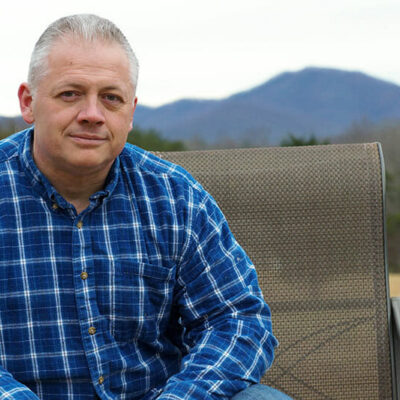Think of the Hub as a missing link. Enthusiasm runs high in these parts for local food—it represents an alternative to the big-box way of doing business, among other much-discussed benefits. But that doesn’t mean it’s always easy for consumers to find or for farmers to market and distribute. To close the gap between supply and demand, two local women have spent the past year defining, developing, fundraising, and promoting the Local Food Hub, a nonprofit that opened its Ivy warehouse for business on July 7. The Hub will serve the Thomas Jefferson Planning District, a five-county area that includes Albemarle, Louisa, Fluvanna, Nelson and Greene counties, plus the City of Charlottesville.
|
Kate Collier, feast! co-owner and Local Food Hub founding director, is betting on the quality of local food over “buy local” marketing by big corporations. |
Essentially, the Hub will act as a consolidator and distributor for local farms looking to tap into larger, consistent markets like restaurants and grocery stores. “At this early stage in the game, we’ve already visited 15 small producers in the region, seven of which plan to send us supply on a major scale,” explains co-founder Marisa Vrooman. “We are starting with a small number of independently owned businesses and local non-profits, and hope to work with them on a consistent basis.”
Vrooman and founding director Kate Collier are developing the necessary infrastructure to move food from farm to table, including refrigerated storage, distribution, and support in the vital areas of marketing, billing and forecasting. Organizers are also starting an educational farm in Louisa County and coordinating food donations to local charities like food banks and soup kitchens. Vrooman points out that the Food Hub is funded entirely through local foundations and private donations (at a February Board of Supervisors meeting, Albemarle County declined to pitch in), and that the Hub has successfully attracted volunteer support.
“Our primary short term goal is to develop events, educational programs and local connections to enable our community to be more involved in our local food system,” explains Collier, who is also co-owner of the locally focused gourmet grocery store feast!. She outlines a scenario in which the local production of food contributes to land ownership, builds a stronger tax base, creates opportunity for entrepreneurship in the areas of farm inputs and support services, and encourages responsible land stewardship for the future.
Asked to comment on the “localwashing” efforts of larger retailers, Collier says she thinks quality and freshness will win out. “The independently owned stores and restaurants that sell local produce are able to offer a superior quality product that differentiates them from the chains and increases the faithfulness of their customers, helping to grow their business and solidify the importance of independent retailers in our community,” she says. “We hope to make farming a viable professional choice and attract and retain the next generation of food producers in Central Virginia.”
Updates on the Local Food Hub project can be found at www.localfoodhub.org and http://chofoodhub.blogspot.com.—Lisa Reeder






